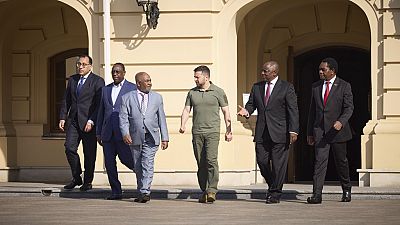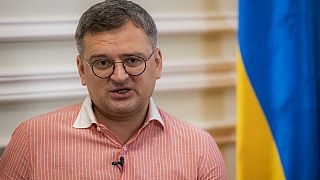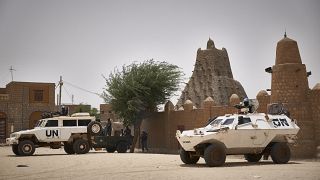Russia's invasion of Ukraine
Some African leaders are raising their voices against rich countries that are quick to pour billions of dollars into Kiev but do not always live up to their commitments to the continent.
At the last meeting of the International Monetary Fund and the World Bank in Washington in April, "African countries expressed fears about double standards" in terms of international aid, a French government source said.
The war in Ukraine "exposes the true face of the great powers' action towards the continent", said a diplomatic source in Benin, interviewed ahead of a summit this week in Paris on poverty and climate financing, lamenting the fact that Africa has been "neglected".
Much of the aid to Ukraine is in the form of weapons, but this inevitably leads to comparisons.
Partly destroyed by Russia and with its GDP plummeting by 30% last year, Ukraine has seen an influx of aid from all over the West. By 24 February, its allies had pledged just over €150 billion in aid, according to data compiled by the Kiel Institute for the World Economy (IfW). And new funding could be announced at an international conference in London on Wednesday on the reconstruction of the country, estimated by the World Bank at 411 billion dollars.
According to the OECD, sub-Saharan Africa, the main recipient of development aid, saw aid fall last year to 29 billion dollars (-8%), while aid to Ukraine soared to 16 billion, compared with less than one billion a year earlier.
"We're seeing these huge flows that we thought would never be released, but which are now being released", Niger's Foreign Affairs Minister Hassoumi Massoudou explained. He sees this as proof "that resources and mechanisms exist" that could also be used for the continent.
"Unprecedented support"
All the more so as some African countries are themselves facing armed conflicts on top of economic crises. "There are conflicts in northern Congo, Sudan and other parts of Africa, but the support Ukraine is getting from Western countries is unprecedented. The West is concentrating on supporting Western countries", lamented a government source in Zambia.
A restructuring of the debt of this country, which has been in default since 2020, could be proposed this week, a source within the Paris Club, which brings together Western public creditors, hoped on Monday.
Negotiations on the subject for this country, as for Ghana, have so far been blocked by the lack of consensus between Western countries and China, which has become a key lender in recent years.
The rich countries are also being criticised for failing to honour their commitments, primarily the payment of $100 billion a year promised in 2009 to combat climate change, and the recycling of $100 billion in Special Drawing Rights (SDRs), the institution's reserve asset, which has not yet been completed.
Adopted at COP27 in Sharm-el-Sheikh, a fund aimed at compensating rich countries for the "loss and damage" suffered by the countries of the South has still not been replenished.
"There is a crisis of confidence between donor countries and the countries of the South", notes Elise Dufief, a researcher at the Institute for Sustainable Development and International Relations (IDDRI). Especially as "when we see the crisis in Ukraine or North American banks going bankrupt, there is a very rapid response".
Africa's feeling of being forgotten also stems from its representation in the bodies that determine international priorities and in which the continent is calling for greater influence, such as the G20 and the UN.
"The history of Africa's subjugation and exclusion calls for a radical re-examination of the way it is represented in global institutions", writes Howard W. French, professor of journalism at Columbia University, in the magazine Foreign Policy, pointing out that "its population, which represented less than a tenth of the world's population in 1950, will account for 40% of humanity by the end of the century".













11:19
Cyber Africa Forum highlights Benin's bold digital resilience [Business Africa]
Go to video
World Bank grants South Africa $1.5B for infrastructure, green energy
01:46
Poverty drives instability, conflict - UN chief
11:16
Angola hosts U.S.-Africa summit amid calls to revive trade ties {Business Africa}
01:30
Abu Dhabi hosts first Global South Economic Forum
01:50
Migrant workers sent US$685 Billion in remittances to families in 2024